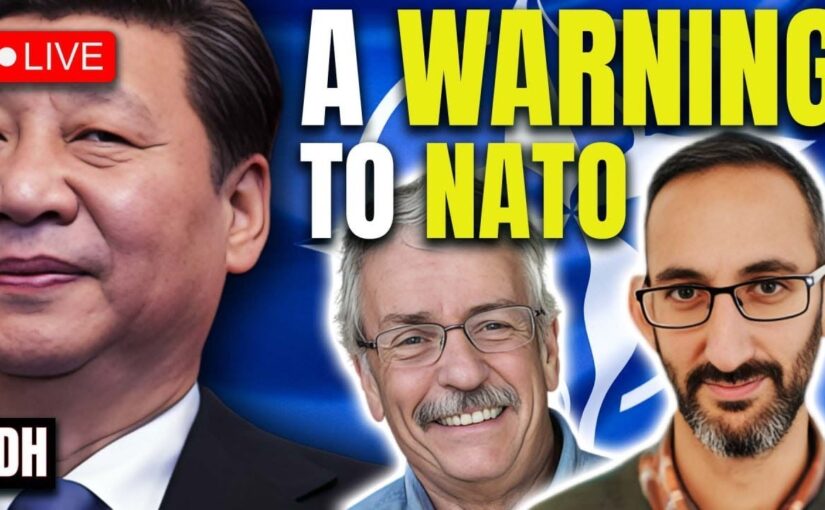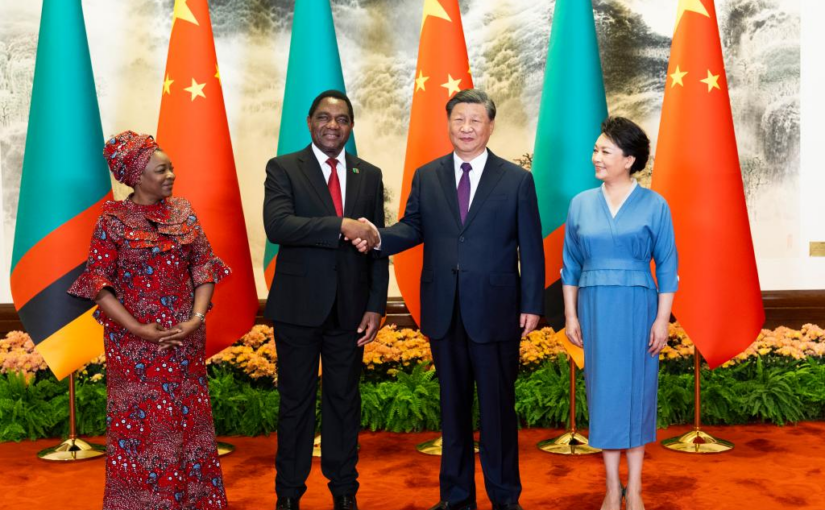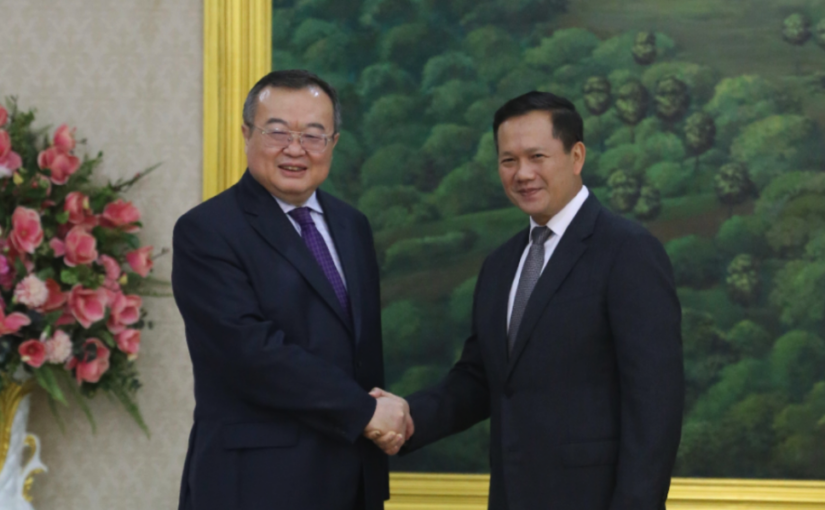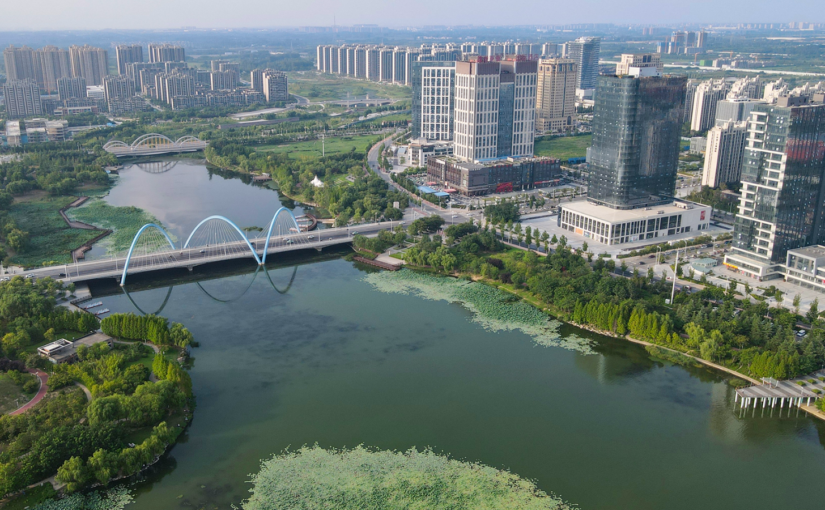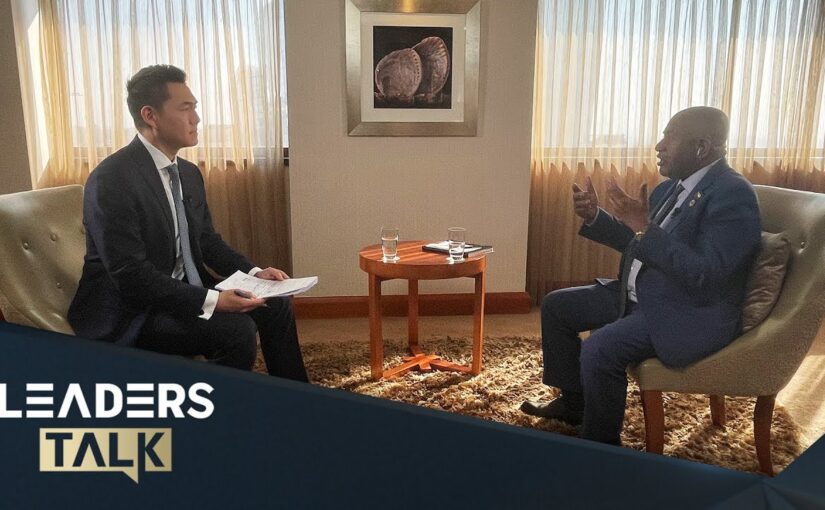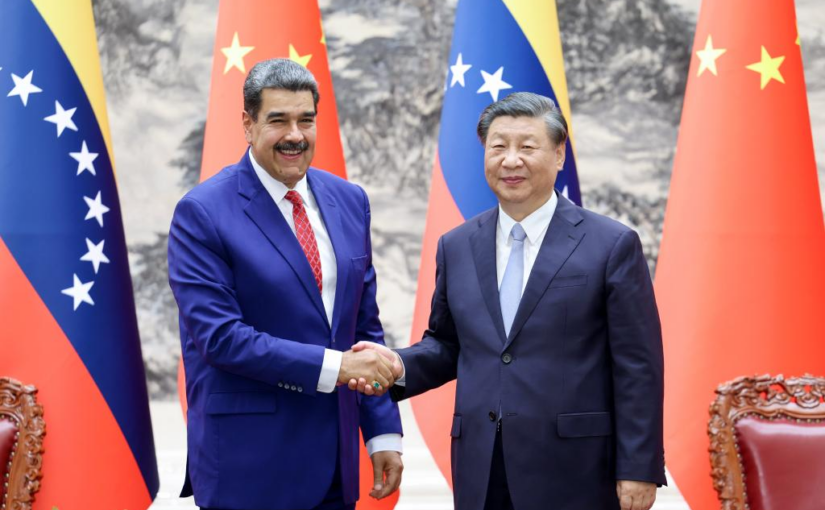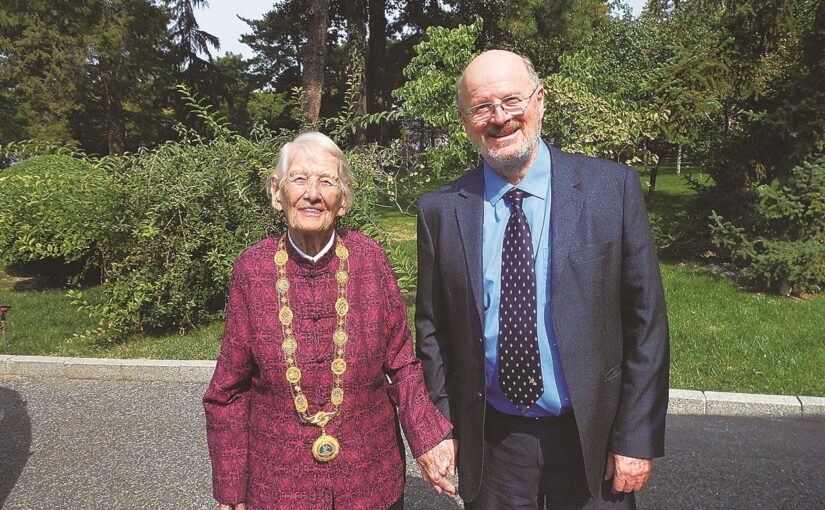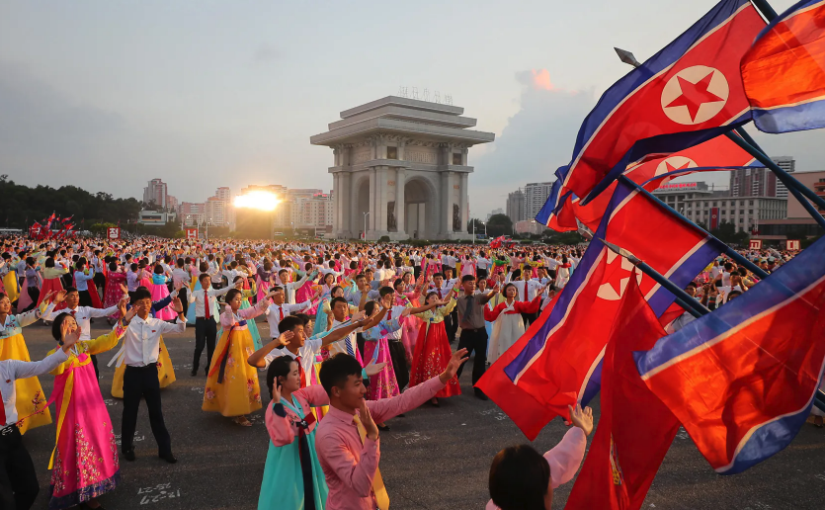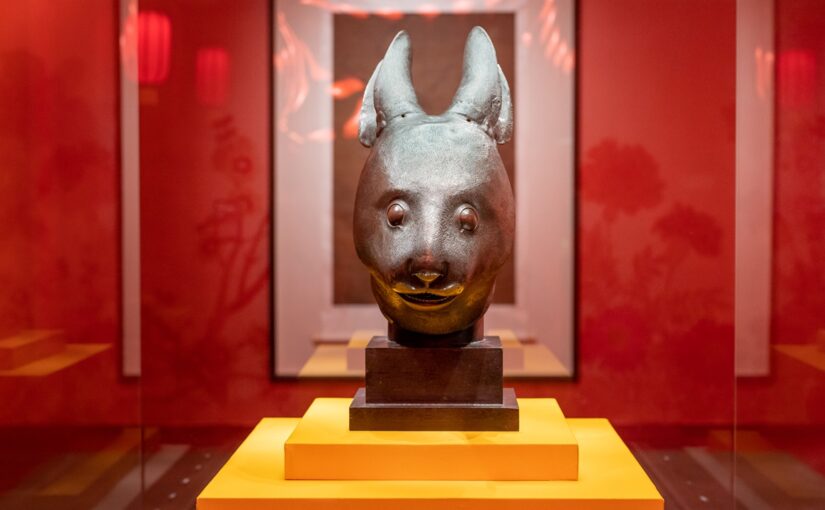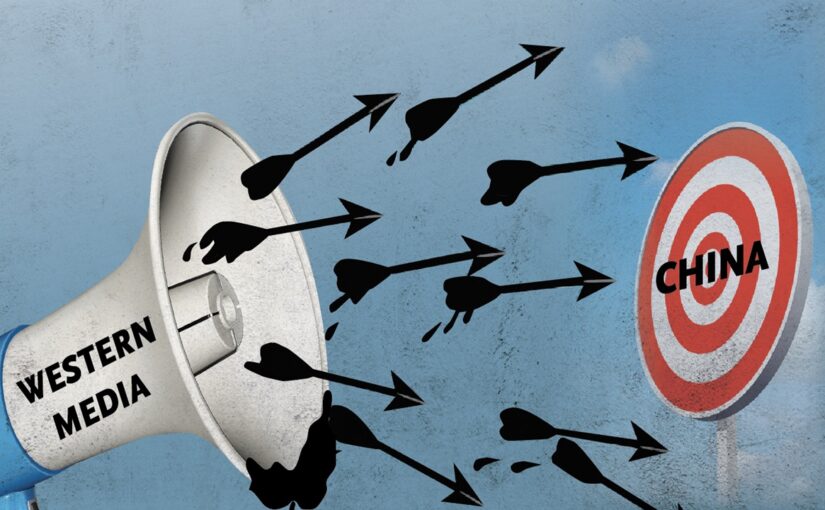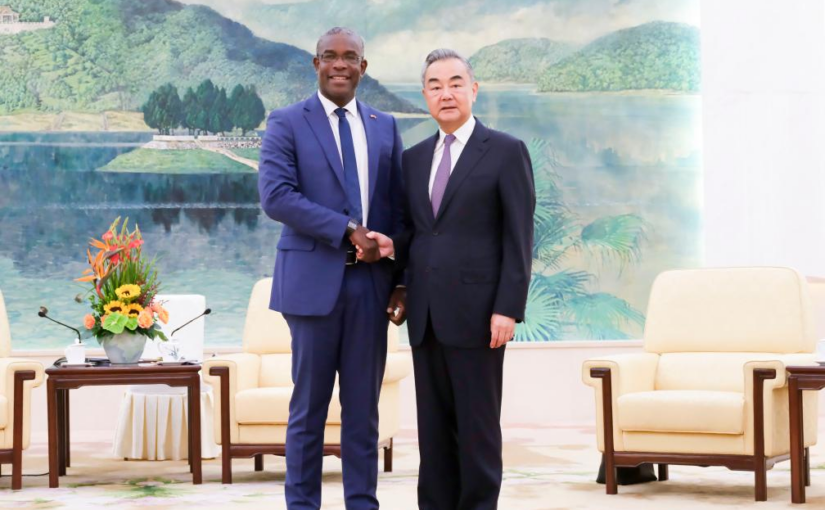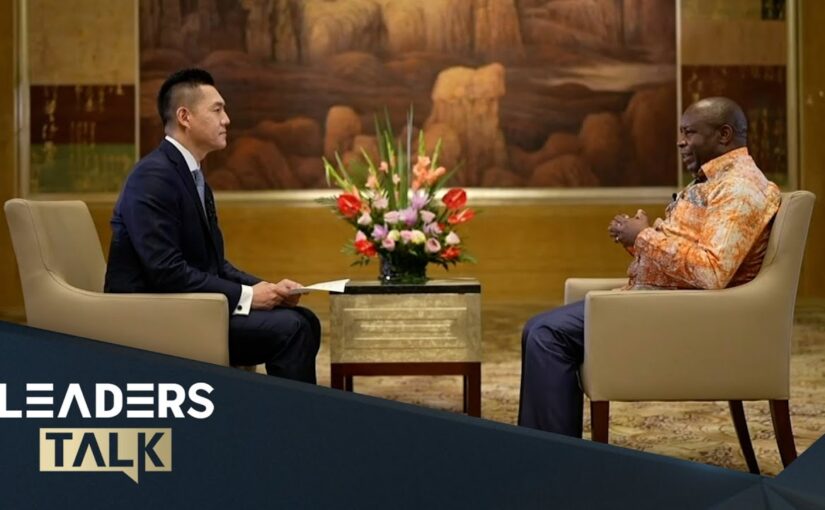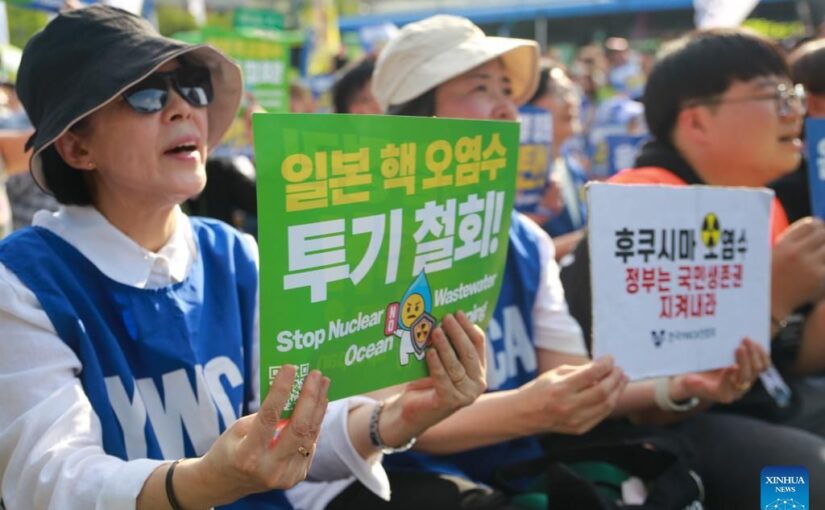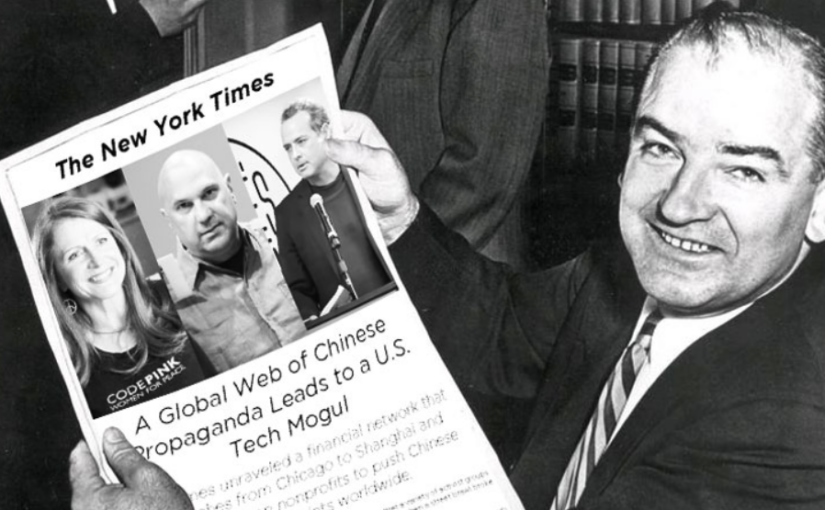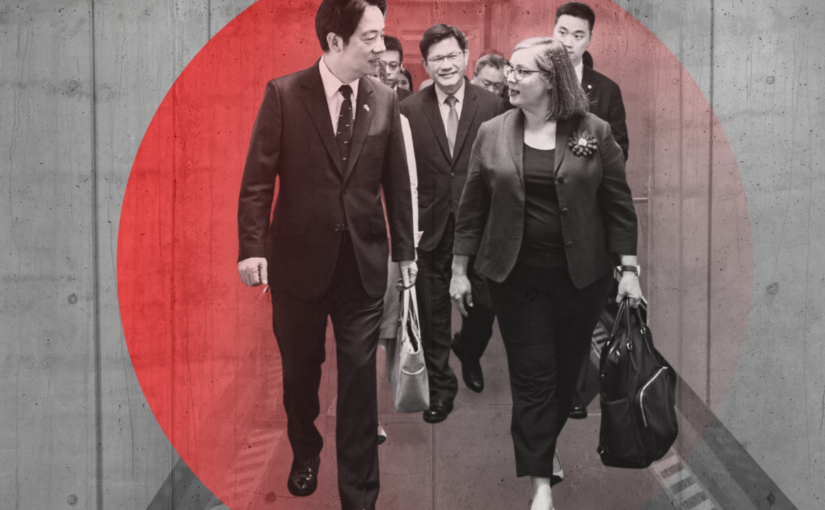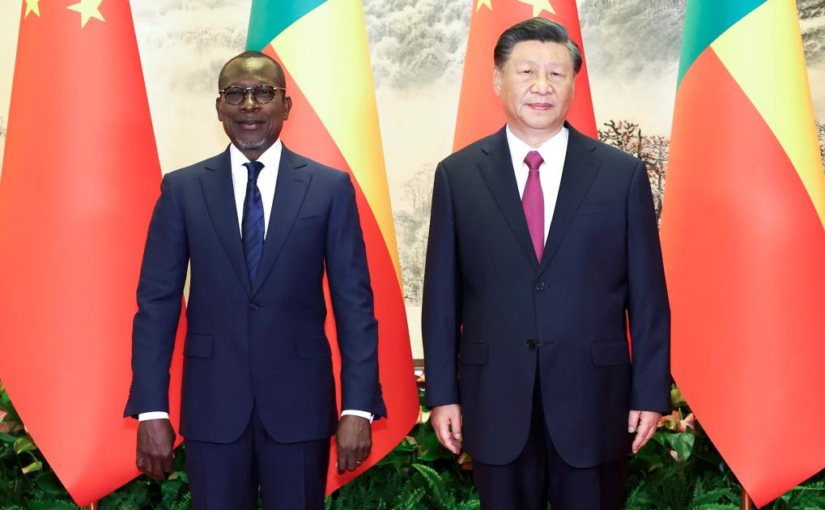On 6 September 2023, Carlos Martinez and Dr Ken Hammond joined Danny Haiphong live on his YouTube channel to discuss the latest developments regarding the US’s hybrid war on China and the multipolar world.
They have a detailed discussion on the US attempts to prevent China from developing advanced semiconductors; the recent advances made by Huawei and SMIC in precisely the field of advanced semiconductors; the contradiction between the requirements of the US business community and the strategic designs of the New Cold War; the state of the Chinese economy; the successes of the BRICS Summit in Johannesburg; the significance of BRICS; China’s prioritisation of relations with the countries of the Global South and those countries outside the US imperialist orbit; and more.
The three pay tribute to the recently-deceased comrade and veteran friend of China Isabel Crook, and also discuss Carlos’s and Ken’s books on China, both of which have been published in 2023.
Month: September 2023
China and Zambia announce comprehensive strategic cooperative partnership
President of Zambia Hakainde Hichilema paid a state visit to China from September 10-16 at the invitation of his Chinese counterpart Xi Jinping.
Meeting for talks in Beijing on September 15, the two heads of state announced the elevation of their countries’ bilateral relationship to that of a comprehensive strategic cooperative partnership.
Xi Jinping said that the traditional friendship forged by the two countries’ older generations of leaders has stood the test of the changing international landscape, and the Tanzania-Zambia Railway (TAZARA) has become a symbol of China-Africa friendship.
The friendship between Zambia and China was forged and carefully nurtured by the founding father of independent Zambia Dr Kenneth Kaunda along with Chinese leaders Mao Zedong and Zhou Enlai. China’s largest foreign aid project at the time, the TAZARA railway was opened in 1975, when China itself was still a poor country, and enabled landlocked Zambia to break the isolation and blockade imposed on it by countries to its south then still under white racist and colonial rule.
Xi said China has always viewed and developed China-Zambia relations from a strategic and long-term perspective and stands ready to work with Zambia to transform the profound traditional friendship into a strong driving force for win-win cooperation in the new era and push bilateral relations to a new level.
He added that China supports Zambia in safeguarding national sovereignty, security and development interests and exploring a development path suited to its own conditions. He expressed China’s willingness to strengthen inter-party exchanges and exchanges of state governance experience with Zambia. The two countries should support each other on issues related to their respective core interests and major concerns.
The success of Chinese modernisation shows the diversity of modernisation models in the world, and China’s high-quality development and modernisation process will continue to bring new opportunities to all countries including Zambia, Xi said.
He called on the two sides to make a success of the celebration of the 60th anniversary of the establishment of diplomatic ties next year and step up exchanges and cooperation in education and training, health care, culture, tourism and other fields.
Noting that the collective rise of developing countries and their increasing international influence have become an irreversible trend of the times, Xi said China and Zambia need to strengthen solidarity and coordination, practice genuine multilateralism, firmly uphold international fairness and justice, strive to increase the voice of developing countries, and safeguard the common interests of the two countries and other developing countries.
Hichilema said Zambia cherishes the friendship forged by the older generations of leaders of the two countries. China’s development has led to the progress of countries in the Global South, increased their representation and voice in international affairs, and promoted the development of international order in a more just and rational direction, he added. Zambia thanks China for supporting the African Union’s entry into the G20 and China’s positive role in resolving the Zambian debt issue.
The establishment of a comprehensive strategic and cooperative partnership between the two countries was announced in a 32-point joint statement.
Among the myriad of issues it addressed, the two sides agreed that climate change is a challenge facing humanity and that the international community needs to collectively respond. The developed countries shoulder inescapable historical responsibilities over climate change, and should, therefore, take the lead in undertaking emission reductions obligations by a large margin and faithfully honour their commitment to the developing countries regarding financial, technical and capacity-building support.
China and Zambia will establish a green development strategic partnership and enhance cooperation on environmental protection, combating climate change, green economy, and emergency risk response mechanism, among others. The two sides will deepen mutually beneficial cooperation on renewable energy, such as photovoltaic power, and electric vehicle industries to promote energy transition and ensure energy security. The Zambian side applauded the Chinese efforts, determination and actions to pursue green and low-carbon development and to participate actively in international cooperation against climate change and will take them as an opportunity to advance relevant cooperation between the two sides.
The two sides will also enhance mutually beneficial cooperation in mineral exploration and mining and industries aimed at value addition. The Zambian side invited Chinese mining businesses to continue active participation in the mining sector. The Chinese side encourages Chinese businesses to invest in Zambia’s new-energy battery value chain development so as to support Zambia’s efforts to upscale industrial chains and boost its capability for independent development.
At the request of the Zambian side, the Chinese side is ready to support the upgrade and renovation of the TAZARA Railway in line with market and commercial principles.
Once again congratulating the Communist Party of China on its 20th National Congress, held last year, the Zambian side commended China for the great achievements made in the past 10 years of the new era, and recognised that Chinese modernisation has created a new model of human advancement which has provided a new option for other developing countries to independently pursue modernisation and explore diverse paths towards modernisation.
The two sides noted that the year 2024 marks Zambia’s 60th anniversary of independence as well as the 60th anniversary of the establishment of their diplomatic ties. The commemoration should be an opportunity to bring into full play the political leading role of the head-of-state diplomacy, keep the momentum of high-level exchanges and dialogue, enhance political mutual trust and consolidate the political foundation for the bilateral relationship. The two sides stressed that mutual respect, equality and common development are important principles of China-Zambia relations.
They encourage greater use of national currencies in trade and investment and will help businesses of both countries reduce costs of currency exchange and lower exchange rate risks. The two sides will also create a favourable policy environment for promoting settlements in local currencies and support a greater role of the Chinese Renminbi (RMB) settlement bank in Zambia.
The Zambian side appreciates China’s Position on the Political Settlement of the Ukraine Crisis. The Chinese side appreciates that President Hichilema and other African leaders formed a peace mission to visit Russia and Ukraine and put forward the African Peace Initiative. The two sides agreed that dialogue and negotiations are the only viable solution and that all efforts conducive to the peaceful settlement of the crisis must be encouraged and supported. The two sides call on the international community to jointly address the spillover effects in food, energy, finance, transportation, and other fields, and to reduce the negative impact of the crisis on the developing world, especially on African countries. They call on more countries to play a constructive role in the peaceful settlement of the crisis.
The two sides will strengthen health cooperation. The Chinese side will continue to support Zambian public health system building and dispatch medical teams to Zambia. The Zambian side expressed gratitude for China’s continued support to Zambia’s health sector, especially during the COVID-19 pandemic.
President Hichilema sincerely thanked President Xi and the Chinese government and people for their warm hospitality. President Hichilema invited President Xi to visit Zambia in 2024 on the occasion of the 60th anniversary of the establishment of diplomatic relations.
President Hichilema also met with Chinese Premier Li Qiang and Chairman of the National People’s Congress Zhao Leji on September 15.
Premier Li said that China and Zambia share a profound tradition of friendship and have extensive common interests. Despite the changing international situation, they have strengthened their political mutual trust and their practical cooperation has become closer, setting a good example of solidarity and coordination between developing countries.
China and Zambia should not only expand and strengthen cooperation in established areas such as mining and infrastructure construction, but they should also create new cooperation growth areas such as green development, the digital economy, and industrial and agricultural modernisation, he said. By doing so, they can embark on a path of modernisation featuring mutual assistance and common revitalisation among developing countries.
Hichilema said that Zambia and China enjoy an all-weather friendship, and that bilateral relations are as firm as a rock. Zambia opposes the ‘China debt trap’ and ‘economic decoupling’ narratives, and is willing to work with China to promote common development, he added.
Zhao Leji commended the important and unique role that China-Zambia relations had played in the history of China-Africa friendly exchanges. The profound historical heritage and solid political foundation of the bilateral relationship have withstood the vicissitudes of the international landscape and remain rock-solid.
Noting that next year marks the 60th anniversary of the establishment of diplomatic ties between the two countries, Zhao said China is ready to work with the Zambian side, under the guidance of the important consensus reached by the two heads of state, to further deepen political mutual trust, enhance the synergy of development strategies and jointly build a high-quality Belt and Road, and to achieve new and greater development of bilateral relations and bring more benefits to the two peoples.
The following articles were originally carried by the Xinhua News Agency.
Xi, Hichilema announce elevation of China-Zambia ties
BEIJING, Sept. 15 (Xinhua) — Chinese President Xi Jinping held talks with his Zambian counterpart, Hakainde Hichilema, in Beijing on Friday.
The two heads of state announced the elevation of the China-Zambia relations to a comprehensive strategic cooperative partnership.
Continue reading China and Zambia announce comprehensive strategic cooperative partnershipLiu Jianchao visits Cambodia, Vietnam and Laos
In the first week of September, Minister Liu Jianchao of the International Department of the Central Committee of the Communist Party of China (IDCPC), paid visits to the southeast Asian countries of Cambodia, Vietnam and Laos. Vietnam and Laos are fraternal socialist countries of China and the contemporary relations between all four countries are deeply rooted in their common struggle against the US imperialist war of aggression for national independence and salvation.
Minister Liu travelled first to Cambodia and on September 3 met with Hun Manet, who assumed office as his country’s new Prime Minister on August 23, shortly after a general election saw another resounding victory for the Cambodian People’s Party (CPP). Hun Manet asked Liu to convey his sincere greetings to General Secretary Xi Jinping and Premier Li Qiang. He said, the victory of the Cambodian People’s Party (CPP) in Cambodia’s seventh general election reflects the Cambodian people’s high recognition of the CPP’s governance and their expectations for the new government. The new government will continue to firmly adhere to the CPP’s friendly policies towards China and make the relationship between Cambodia and China even better. I will choose China as my first official outbound visit after taking office as Prime Minister, he said. On September 11 it was announced that that visit will take place, September 14-16.
The following day, Minister Liu met with Hun Sen, President of the CPP, who served as Prime Minister from November 1998 to August 2023. Hun Sen said that his party’s victory in the July 23 general elections also reflects the satisfaction and support of the Cambodian people for the achievements in the development of China-Cambodia relations. The Cambodian side appreciates the Chinese side’s long-standing support and assistance to Cambodia’s national development and is willing to strengthen strategic alignment with the Chinese side, deepen practical cooperation in various fields, closely coordinate and cooperate in multilateral affairs, and jointly safeguard regional and global stability and development.
Liu also met with Norodom Chakravuth, President of the FUNCINPEC party, which is generally described as Cambodia’s royalist party. Chakravuth affirmed that FUNCINPEC has long upheld King Father Norodom Sihanouk’s friendly policy towards China, always considering the CPC as a good and true friend. FUNCINPEC is ready to contribute to the building of the Cambodia-China community with a shared future. His party expressed gratitude for the long-term support from the CPC and the Chinese government to the Cambodian royal family, and its commitment to deepening friendly exchanges and cooperation with the CPC. Since the time of Norodom Sihanouk, the Cambodian royal family has maintained a close relationship with the Asian socialist countries and their ruling communist parties.
Continuing to Vietnam, on September 5, Minister Liu met with Nguyen Phu Trong, General Secretary of the Central Committee of the Communist Party of Vietnam (CPV).
Nguyen Phu Trong asked Liu to convey his warm greetings and best wishes to General Secretary Xi Jinping. He said, as the first foreign leader to visit China after the 20th CPC National Congress, held in October 2022, I received a warm and friendly reception from the CPC and the Chinese people. In particular, General Secretary Xi Jinping had in-depth and friendly exchanges with me. I sincerely welcome and look forward to General Secretary Xi Jinping’s visit to Vietnam again at an early date to discuss plans for the development of relations between the two Parties and the two countries under the new situation, and to lead Vietnam-China relations for new and greater development.
The Vietnamese leader added that the Vietnam-China relationship has a long history and has become stronger over time. Just as President Ho Chi Minh remarked, China and Vietnam enjoy comradely and brotherly friendship. The Vietnamese side will always remember the great support and assistance provided by the CPC and the Chinese people for the Vietnamese side in all historical periods, and always regard developing relations with the CPC, the Chinese government and people as a top priority.
Liu said, in the face of complex and volatile international and regional situations, China and Vietnam should further strengthen unity and cooperation, implement the important consensus reached by the general secretaries of the two parties, work together to deal with various risks and challenges on the way forward, effectively promote the respective national development and socialist causes, and promote the building of a community with a shared future for humanity. If the two Parties, countries and peoples stay united, the friendship between China and Vietnam will grow deeper.
He also held talks with Le Hoai Trung, Head of the Commission for External Relations of the Central Committee of the Communist Party of Vietnam.
Speaking highly of China’s great achievements in the past ten years since it entered the new era, Le Hoai Trung believed that under the leadership of the CPC Central Committee with Comrade Xi Jinping at its core, Chinese comrades will certainly achieve the second centenary goal. The Vietnamese side firmly supports socialist China in growing stronger and making greater contributions to the development of the world and the region. The Vietnamese side insists on giving top priority to developing its relations with China.
While meeting with representatives of all walks of life of Vietnam including think tanks, media, and friendly organisations, Vietnamese comrades told Liu that, as socialist countries led by communist parties, the two sides should take the 15th anniversary of the establishment of the China-Vietnam comprehensive strategic cooperative partnership as an opportunity to strengthen high-level exchanges, deepen exchanges and mutual learning in state governance and administration, firmly establish a common direction of progress, solve the problems of the times, and promote the causes of socialism of our two countries for continuous development.
Liu also led a CPC delegation to pay respect to the leader of the Vietnamese revolution, Ho Chi Minh at his mausoleum.
The final stop of Minister Liu’s regional tour was in Laos, where, on September 8, he met with Thongloun Sisoulith, General Secretary of the Lao People’s Revolutionary Party (LPRP) Central Committee and Lao President.
Thongloun asked Liu to convey his sincere greetings and best wishes to General Secretary Xi Jinping. Thongloun said, at the end of last year, I paid a successful state visit to China upon invitation, during which General Secretary Xi Jinping and I reached important consensus on the relations between the two parties and the two countries, and vigorously led and promoted the construction of the Laos-China community with a shared future.
He added that the Lao side sincerely thanks the Chinese side for its long-term and huge support to Laos’ socialist cause, and is willing to strengthen cooperation and exchanges with the Chinese side to better promote the development of Laos’ socialist construction.
Among his other engagements in the country, Minister Liu gave a briefing to some 300 Lao cadres and also visited the museum built in honour of the founding leader of the Lao socialist state, Kaysone Phomvihane and presented a floral tribute there. The museum was built with fraternal aid from the Democratic People’s Republic of Korea (DPRK).
The following reports were originally published on the website of the IDCPC.
Hun Manet, Cambodian Prime Minister, Meets with Liu Jianchao
Phnom Penh, September 3rd— Hun Manet, Cambodian Prime Minister, met here today with Liu Jianchao, Minister of the International Department of the CPC Central Committee.
Hun Manet asked Liu to convey his sincere greetings to General Secretary Xi Jinping and Premier Li Qiang. He said, the victory of the Cambodian People’s Party (CPP) in Cambodia’s 7th general election reflects the Cambodian people’s high recognition of the CPP’s governance and their expectations for the new government. Political parties are the source of the country’s formulation of domestic and foreign policies. The new government will continue to firmly adhere to the CPP’s friendly policies towards China and make the relationship between Cambodia and China even better. I will choose China as my first official outbound visit after taking office as Prime Minister. The Cambodian side is willing to implement the important consensus reached by the leaders of the two countries, promote the construction of the “diamond hexagon” cooperation framework, effectively promote the construction of the “Industrial Development Corridor” and the “Fish and Rice Corridor”, and promote the construction of a Cambodia-China community of shared future in the new era. As the head of the CPP’s Youth Wing, I will support the good use of the Youth House for Cambodia-China Friendship, and efforts to strengthen friendly exchanges between the youth of the two Parties. Taiwan, Xinjiang and Hong Kong affairs are all China’s internal affairs. The Cambodian side will continue to firmly adhere to the One-China principle, firmly supports and actively participates in the Belt and Road Initiative and the three major global initiatives proposed by the Chinese side, and is willing to strengthen coordination and cooperation with the Chinese side in international and regional affairs to jointly maintain regional peace, stability, development and prosperity.
Continue reading Liu Jianchao visits Cambodia, Vietnam and LaosCapitalist urbanization, climate change, and the need for sponge cities
In this fascinating article, first published in Liberation School, environmentalist and author Tina Landis explains the concept of sponge cities: what they are, why they are needed, and China’s leading role in developing them.
Tina observes that “the majority of the world’s cities today were built for profit and speculation in mind, with little to no consideration given to negative impacts on either ecology or humanity.”
“Vast hardscapes—sidewalks, roads, parking lots, buildings—and gray infrastructure that channels water away as it falls, places these urban centers at odds with biodiversity and the natural cycling of water through the landscape. Green spaces that are created within urban environments are often highly managed areas separate from the rest of the city, filled with non-native ornamental plants and thirsty grasses that require intensive irrigation, synthetic fertilizers, and pesticides, while providing little to no benefit to native species of birds, insects, and others.”
In an era where humanity faces a rising threat of climate breakdown, developing creative solutions to these problems is literally a matter of life and death. China in particular “is taking comprehensive action to address how urban areas impact the environment and how climate impacts are demanding more resilience in urban planning”, aiming to retrofit and create 30 sponge cities by 2030.
These sponge cities are designed to be climate-resilient population centers. “Sponge cities utilize green infrastructure so that surfaces act as a sponge absorbing water. They integrate space for water to collect such as wetlands and bioswales, create vegetative cover and trees throughout including green roofs and vegetation integrated into building structures, and porous pavement and roads so water can infiltrate soil and catchments underneath to be available during dry times.”
Tina notes that renowned Chinese ecologist and landscape architect Kongjian Yu has been the driving force behind the sponge city movement at a global level. His work has won broad support among China’s political leadership.
Sadly, for the moment, China is the only country developing sponge cities on such a vast scale, as a result of its political system. “Only under a socialist planned economy, like that of China, can real solutions to climate change be implemented on a mass scale.”
Introduction
According to the United Nations Population Fund’s 2009 report, 2008 was the first time in history that over 50 percent of the world’s population resided in cities instead of rural areas. Because of the different ways countries define cities, others date the qualitative shift to as recently as 2021 [1]. Regardless, across the spectrum it’s undisputed we now live in an “urban age” and, as such, transforming the relationship between cities and the natural world is essential for climate change adaptation and mitigation. The international capitalist institutions like the World Bank that are increasingly taking up the issue of cities and climate change can’t explain the various factors behind urbanization nor can they pose real solutions to its impact on or relationship to climate catastrophes. Cities consume 78 percent of the world’s energy resources and produce 60 percent of global greenhouse gas emissions, according to a 2022 UN Habitat report [2]. Under the capitalist model, urban planning lacks a holistic approach, leaving human well being and ecological needs as an afterthought, which will continue to have a degenerative effect on the environment and global climate.
Although Marx and Engels lived during a time in which capitalist urbanization was a nascent phenomenon concentrated mostly in some European cities, like Manchester, the English city about which Friedrich Engels wrote his first and classic book, The Condition of the Working Class in England. Engels demonstrates how the “great town” of Manchester, the first major manufacturing center in England, was great only for capitalist profits. The concentration of capital required for the invention and adoption of machinery outproduced independent handicraft and agricultural production, forcing both into the industrial proletariat of the city. There, they had to work for the capitalists, whose wages were so low they could, if they were lucky, live in overcrowded houses and neighborhoods just outside the city limits. Because the city was produced chaotically for capitalist profits, no attention was given to accompanying environmental impacts [3]. As the masses were driven from their land into the urban factories, the ancestral ties to the land and ecological knowledge of how to live sustainably on that land was lost.
Continue reading Capitalist urbanization, climate change, and the need for sponge citiesComorian President Azali Assoumani: Africa can rely on China
In this episode of the CGTN series, Leaders Talk, Wang Guan interviews Azali Assoumani, President of the Union of the Comoros, who is also this year’s rotating Chair of the African Union (AU). The president of the Indian Ocean island country was interviewed in South Africa’s largest city, Johannesburg, where he was attending the BRICS Summit in late August, alongside the related China/Africa Leaders Dialogue.
President Assoumani was very positive both about the role in international affairs currently being played by the BRICS cooperation mechanism as well as for the prospects of an expanded BRICS Plus, which was first proposed by China. Citing the two examples of the disproportionate control exercised by the western powers over the traditional international financial institutions, as well as the allocation of Covid vaccines, he notes that he had discussed the latter issue with his South African counterpart Cyril Ramaphosa several times. Africa, he points out, has the ability to produce its own vaccines, an area where South Africa, Senegal, Morocco and Egypt, among other countries, have already taken a continental lead.
The Comorian leader was also emphatic on the need for industrialisation, so that Africa can export finished goods and not just raw materials. While the era of political colonialism may be largely over, that of economic colonialism is not. Often Africa exports raw materials and then imports finished goods made from them at ten, twenty or even thirty times the original export price. He therefore endorses the priorities China has set for its economic cooperation with Africa, namely industrialisation, agricultural modernisation and upscaling of the African workforce.
On agricultural modernisation, he highlights the centrality of both food processing and storage, the latter being of particular importance given the propensity of many African countries to drought and to resultant famine.
The president is also an advocate of the growing trend towards dedollarisation. Noting the successful development of the BRICS-initiated New Development Bank (NDB), he says this shows that BRICS countries could also find their way towards a common currency.
Assoumani praises China’s long standing commitment to Africa and notes that the Asian country has been fuelling Comoros’ deveopment. China was one of the first countries to recognise Comoros when it finally won independence from French colonial rule in 1975. China has always supported and stood by Comoros, he says. Therefore Comoros must also do everything it can to support China. Drawing on a popular Comorian saying, he asserts that China is now becoming a wall on which not just his country, but Africa and indeed the whole world can rely.
Africa and China, he notes, have a bond of brothers. Some other countries may be jealous of this relationship, but they, too, could enjoy a similar relationship if they treated their African counterparts as friends and brothers.
Located at the northern end of the Mozambique Channel in the Indian Ocean, Comoros consists of four main islands and numerous smaller islands. However, France remains in colonial occupation of Mayotte, one of the major islands, making this issue part of the unfinished business of African decolonisation. France has even vetoed UN Security Council resolutions that would affirm Comorian sovereignty over the island. The CGTN commentary correctly refers to Mayotte as part of the sovereign territory of the Union of the Comoros.
The full interview with President Assoumani is embedded below.
China and Venezuela establish all-weather strategic partnership
The President of Venezuela, Nicolás Maduro Moros, paid his third state visit to China from 8 to 14 September at the invitation of his Chinese counterpart, Xi Jinping. His last visit was in September 2018. With a special focus on economic cooperation, development and diversification, the visit was highly successful and saw the bilateral relationship upgraded to an all-weather strategic partnership, a category that China has so far only agreed with a handful of countries.
Meeting President Maduro in Beijing on September 13, Xi Jinping said that “the establishment of an all-weather strategic partnership between China and Venezuela meets the common expectations of the two peoples and conforms to the general trend of historical development.”
Xi spoke about China’s reform and opening up, especially the development of special economic zones, and noted that these are important instruments for China to catch up with the times in great strides and a crucial move in making China what it is today.
He added that China stands ready to work with Venezuela to firmly support each other in exploring a development path suited to their national conditions and to strengthen party and national governance exchanges. He said China supports Venezuela in setting up special economic zones and will share relevant experience to help its national development.
Maduro said Venezuela’s national development and Venezuela-China relations are at a significant stage. “The establishment of an all-weather strategic partnership is of historic significance and will surely usher in a new era of bilateral relations.”
He added that Venezuela is willing to learn from China’s experience in building special economic zones and to deepen practical cooperation in agriculture, investment, education, and tourism.
The two heads of state agreed a detailed joint statement. It noted that China and Venezuela are good friends with mutual trust, good partners for common development and good comrades-in-arms in strategic cooperation. China firmly supports Venezuela in safeguarding national independence, sovereignty, national dignity, socio-economic stability, and the right to self-determination under the guidance of the legacy of liberator Simón Bolívar.
The two sides agreed that at present, the changes in the world, the times and history are unfolding in an unprecedented way. China and Venezuela are both developing countries and share extensive common interests and similar positions in international affairs. The two sides spoke positively of the strategic cooperation between the two countries in international organisations and multilateral mechanisms and will continue to firmly support each other in international affairs.
The Venezuelan side reaffirms its interest in joining the BRICS countries, which, as a reliable energy supplier, with the world’s largest oil and fourth largest natural gas reserves, can make an important contribution to the mechanism’s energy agenda. China welcomes Venezuela’s positive willingness to join BRICS and supports Venezuela’s efforts to achieve this goal.
The statement notes that illegal imposition of unilateral sanctions seriously violates the basic principles of international law, such as the sovereign equality of states and non-interference in internal affairs, and seriously damages the Venezuelan people’s rights to subsistence, development and peace. China firmly supports the Venezuelan people’s just struggle to defend national sovereignty and oppose external sanctions, opposes the imposition of illegal and compulsory unilateral sanctions and so-called “long-arm jurisdiction” by certain countries against Venezuela under any pretext, opposes any acts of political bullying, and opposes military intervention or the threat of force.
The two sides agreed that dialogue and negotiation are the only viable way to resolve the Ukraine crisis, and all efforts conducive to a peaceful settlement of the crisis should be encouraged and supported. The Venezuelan side highly appreciates and firmly supports China’s relevant proposals. The two sides called on more countries to play a constructive role in promoting the political settlement of the Ukraine crisis.
Having noted the two countries’ previous cooperation in satellite launches, the Chinese side welcomed Venezuela to join the cooperation of the International Lunar Scientific Research Station, highly appreciated the signing of the framework agreement on cooperation in the field of space, and is willing to work together to jointly promote the progress of cooperation projects in the fields of communications and remote sensing satellites, lunar and deep space exploration, and promote the improvement of space capabilities and the national economic development of the two countries. Venezuela thus becomes the first Latin American country to whom China has extended such an invitation.
The Venezuelan side sincerely thanked China for its anti-epidemic support to Venezuela during the coronavirus epidemic. Chinese vaccines, medical supplies and Chinese medical teams have played a key role in Venezuela’s fight against the epidemic and made important contributions to saving the lives of millions of Venezuelans. The two sides agreed to promote health cooperation between the two countries by sharing experience and technology.
The two sides spoke highly of the important role of the China-Latin America Forum (CELAC) in promoting China-Latin America relations. They are willing to strengthen communication and coordination on China-CELAC Forum affairs and promote stable and far-reaching China-Latin America relations in the new era of equality, mutual benefit, innovation, openness and benefiting the people. China highly appreciates the positive role played by Venezuela in Latin American and Caribbean affairs and in promoting the sustainable development of China-Latin America cooperation.
President Maduro sincerely thanked President Xi Jinping and the Chinese government and people for their warm and friendly reception during his visit and welcomed President Xi Jinping’s timely state visit to Venezuela.
Maduro had begun his visit on Friday September 8 in Shenzhen, the home of China’s reform and opening up, where a spectacular welcoming ceremony was arranged in the city’s Talents Park, with a light show featuring hundreds of drones, culminating in them spelling out, ‘May the Friendship between China and Venezuela be Eternal’ across the night sky.
President Maduro’s itinerary then took him to China’s financial capital Shanghai and to Shandong Province. Visiting China’s International Poverty Reduction Centre, the Venezuelan leader noted that despite the hardships imposed by the US’ economic war against his country, 77.1% of Venezuela’s budget is devoted to social investment, strengthening programs in food production and distribution, social housing, education, health and social security.
Further underlining the great importance that Venezuela attaches to its relations with China, Maduro’s visit was immediately preceded by, and overlapped with, one by his Vice President Delcy Rodriguez, who arrived in China on September 5, primarily to attend the 17th Meeting of the Mixed Venezuela-China High Level Committee and to review and confirm bilateral agreements prior to the state visit.
On the day prior to Maduro’s arrival, she met with China’s top diplomat, Foreign Minister Wang Yi, who said that their two countries had forged an unbreakable, iron-clad friendship. On the day of Maduro’s arrival in Shenzhen, she met with her counterpart, Vice President Han Zheng in Beijing.
The following reports originally appeared on the websites of the Xinhua News Agency, the People’s Daily and Telesur. The full text of the joint statement was machine translated from Chinese and lightly edited by us.
Xi, Maduro announce elevation of China-Venezuela ties
BEIJING, Sept. 13 (Xinhua) — Chinese President Xi Jinping held talks with his Venezuelan counterpart, Nicolás Maduro Moros, who is on a state visit to China, at the Great Hall of the People on Wednesday.
The two presidents announced the elevation of the China-Venezuela relationship to an all-weather strategic partnership.
“The establishment of an all-weather strategic partnership between China and Venezuela meets the common expectations of the two peoples and conforms to the general trend of historical development,” Xi said, calling on the two sides to push for more fruitful China-Venezuela strategic cooperation, bring more benefits to the two peoples and inject more positive energy into world peace and development.
Xi spoke about China’s reform and opening up, especially the development of special economic zones, and noted that reform and opening up is an important instrument for China to catch up with the times in great strides and a crucial move in making China what it is today.
Continue reading China and Venezuela establish all-weather strategic partnershipHonouring Isabel Crook and carrying forward China-Canada friendship
The following op-ed, written by H.E. Cong Peiwu, Chinese Ambassador to Canada, pays tribute to Isabel Crook – the Canadian communist and lifelong friend of China who passed away in Beijing on 20 August 2023.
As well as summarising Isabel’s outstanding record in telling the truth about China and in developing foreign language teaching, Ambassador Cong describes how her life was “a vivid example of carrying forward China-Canada friendship.” In this context, the author references Dr Norman Bethune, the Canadian communist and brilliant doctor who worked on the front lines in China’s war of resistance against Japanese aggression, and about whom Mao Zedong wrote that “every Chinese communist must learn” from his spirit of internationalism.
Ambassador Cong concludes with a message to Canadians, but his words will resonate with people throughout the West at a time when imperialist governments and media are ramping up anti-China hostilities and McCarthyite repression:
I encourage all of you to experience China firsthand, and you will understand why many Canadians like Crook have forged such deep bonds with China and the Chinese people. I’m also confident that there will be more friendly personages like Isabel Crook and Norman Bethune, who will continue to nurture and carry forward China-Canada friendship.
This tribute was first published in The Canada Files.
The passing of Isabel Crook in Beijing at the age of 108, on August 20, has left us all saddened. Just like many of you, I have extended my condolences.
Crook’s life was a true reflection of people-to-people friendship between our two countries. Born in Chengdu, China, in 1915 to Canadian parents, she spent most of her life in China, and witnessed the founding of the People’s Republic of China. Crook once said, “I’m truly thankful to my parents for bringing me into this world in China.” Although she has passed away, her deeds and contributions continue to exert profound influence.
Through her works, she provided Westerners with more insights into the real China. Most importantly, she demystified China for Westerners during her time, helping them recognize the significance of engaging with China and its people.
Isabel Crook witnessed China’s development and transformation throughout her lifetime. She cared about rural development in China, devoted herself to education, and nurtured numerous talents.
Having spent over 90 years in China, she witnessed monumental changes in Chinese society. She saw, experienced and participated in China’s tremendous transformation from standing upright to becoming prosperous and growing in strength. “I’m very fortunate to be an observer to this great era. I believe my beloved China is getting better and better,” Crook expressed. In 2019, in recognition of her outstanding contributions to China’s education and friendly exchanges with the world, the Chinese government awarded her the Friendship Medal of China, the country’s highest honor bestowed upon foreign nationals.
Crook’s entire life was a vivid example of carrying forward China-Canada friendship. She dedicated her glorious years to China, blazing a trail in English teaching in New China and nurturing countless foreign language talents. “We see the fruits of our work, batches of graduates, contribute their strength to building New China and the new world. We are very proud of them,” she remarked.
Friendship transcends borders, and she never walked alone. Henry Norman Bethune, a Canadian surgeon, made the ultimate sacrifice in China when helping the Chinese people resist Japanese aggressors during the War of Resistance against Japanese Aggression. Besides, there are also many other Canadian recipients of the Chinese Government Friendship Award who have actively contributed to China-Canada friendship.
As an old Chinese saying goes, “Peaches and plums do not talk, yet a path is formed beneath them.” Beginning as a seed of hope, her spirit has grown into a towering tree. I encourage all of you to experience China firsthand, and you will understand why many Canadians like Crook have forged such deep bonds with China and the Chinese people. I’m also confident that there will be more friendly personages like Isabel Crook and Norman Bethune, who will continue to nurture and carry forward China-Canada friendship.
China congratulates DPRK on the 75th anniversary of its founding
China’s socialist neighbour, the Democratic People’s Republic of Korea (DPRK) celebrated its 75th founding anniversary on September 9.
Greeting the occasion, China’s leader Xi Jinping sent a warm message to his DPRK counterpart, Kim Jong Un.
Xi said that, thanks to the steadfast leadership of the Workers’ Party of Korea (WPK) and the tireless efforts of the Korean people, the cause of socialist construction in the DPRK has achieved steady and new successes for 75 years.
China and the DPRK are friendly neighbours sharing mountains and rivers, the message said, adding that the traditional China-DPRK friendship, personally provided and cultivated by the leaders of the elder generation of the two parties and two countries, has struck roots deep in the mind of the two peoples and is growing stronger with the passage of time.
It is the steadfast stand of the Chinese party and government to defend, consolidate and develop the traditional China-DPRK friendly and cooperative relations with credit, no matter how the international and regional situation may change, under the great changes unprecedented in a hundred years taking place rapidly.
A Chinese party and government delegation, led by Liu Guozheng, member of the Political Bureau of the Communist Party of China Central Committee and Vice Premier of China, visited the DPRK from September 8 to 11 to participate in the celebrations.
Kim Jong Un met with the Chinese guests on the day of their arrival. He noted that the Chinese comrades’ participation in the celebrations of the founding anniversary of the DPRK added glory to the events for marking its national day. Saying that he deeply realised through the Chinese party and government delegation’s visit to the DPRK that Comrade Xi Jinping and the Chinese party and government attach great importance to the special nature of the DPRK-China relations, he expressed thanks and high appreciation for it.
Conveying the cordial greetings of Xi Jinping, General Secretary of the CPC Central Committee, to Kim, Liu Guozheng extended warm congratulations on the 75th anniversary of the DPRK’s founding, made positive comments on the DPRK’s construction achievements, and wished the DPRK a prosperous future and its people a happy life with the country’s socialist cause flourishing and its development path getting wider.
China prizes the traditional China-DPRK friendship and is willing to push for the continuous consolidation and development of bilateral relations, he said.
Liu is in charge of the agriculture and health care sectors in China, and he noted that they are important undertakings for people’s livelihood, adding that China is willing to deepen exchanges and cooperation with the DPRK in these areas so as to benefit their people.
During their visit, the Chinese delegation also met with Premier Kim Tok Hun; attended a parade of paramilitary forces; visited the Friendship Tower, which honours the fallen fighters of the Chinese People’s Volunteer Army who fought in the 1950-53 Korean War; visited the DPRK-China Friendship Thaekam Farm, which DPRK President Kim Il Sung and Chinese Premier Zhou Enlai visited together in 1958; attended a grand musical performance as well as a reception and banquet; and paid respects to the statues of late DPRK leaders Kim Il Sung and Kim Jong Il on Pyongyang’s Mansu Hill, as well as at the Chinese People’s Volunteers Martyrs Cemetery in Anju City.
The following reports were originally published by the Korean Central News Agency (KCNA) and the Xinhua News Agency.
Respected Comrade Kim Jong Un Receives Greetings from President Xi Jinping
KCNA, 9 September 2023
Pyongyang, September 9 (KCNA) — Kim Jong Un, general secretary of the Workers’ Party of Korea (WPK) and president of the State Affairs of the Democratic People’s Republic of Korea, received a message of greeting from Xi Jinping, general secretary of the Central Committee of the Communist Party of China (CPC) and president of the People’s Republic of China, on Sept. 9.
In the message, Xi Jinping extended heartfelt congratulations on behalf of the CPC and the Chinese government and people and on his own behalf to Kim Jong Un and to the WPK and the government and people of DPRK on the 75th birthday of the DPRK.
Thanks to the steadfast leadership of the WPK and the tireless efforts of the Korean people, the cause of socialist construction in the DPRK has achieved steady and new successes for 75 years, the message said.
Noting that in recent years General Secretary Kim Jong Un has made important achievements by guiding the Korean party and people to thoroughly implement the spirit of the Eighth WPK Congress and the plenary meetings of the Party Central Committee and channeling big efforts into the economic development and the improvement of people’s living, it expressed belief that under the leadership of the General Secretary and the WPK, the fraternal Korean people would surely accelerate the socialist cause of the DPRK and thus steadily achieve new development and put it on a new stage.
Continue reading China congratulates DPRK on the 75th anniversary of its foundingIreland’s neutrality is at stake
In this article, originally published by Socialist Voice, Jimmy Corcoran, who is the General Secretary of the Communist Party of Ireland (CPI), takes up the new and increasing danger to what remains of Irish neutrality.
Neutrality is enshrined in the Irish constitution, but has been considerably undermined over recent years. That process has been further expedited with both the conflict in Ukraine and the new cold war against China, despite the principled position in defence of neutrality put forward by Irish President Michael D Higgins.
So far, Higgins’ public stance has prevented a formal application for NATO membership, but Micheál Martin, leader of the Fianna Fáil party and Tánaiste (Deputy Prime Minister), Minister for Foreign Affairs, and Minister for Defence in the Irish government, is now seeking to weaken the constraints on the deployment of Irish troops overseas as a thin end of the wedge. Hitherto, Irish troops have essentially been confined to United Nations peacekeeping duties overseas.
Corcoran notes that: “In the event of Sinn Féin becoming the major party in the next 26-County government [as is currently highly likely] they will be faced with this pro-imperialist bias [on the part of the Irish ruling class].”
The possibility of a revision or modification in Sinn Féin’s historically strong position on neutrality is currently a matter of public debate both within and outside the party. The CPI General Secretary poses the questions: “How will they react? Will they remain true to their anti-colonial and anti-imperialist tradition, or will they don the Atlanticist clothing of official Ireland?”
His article continues:
“They need to look beyond the world of US, EU and British imperialism towards the developing world. The Chinese share of the world economy is growing, while that of the United States is in relative decline. China is the main trading partner of more than 150 countries. Unlike Ireland, when China embarked on its path of modernising its economy the state remained in control, and it lifted 800 million people out of absolute poverty.”
Making an important call to Sinn Féin, Corcoran concludes:
“One doesn’t have to accept China’s self-designation as a socialist society to recognise that its development strategy has produced far better results than that pursued by the Irish ruling class since the late 1950s. If a Sinn Féin-led government is to develop Irish political and economic sovereignty and tilt the balance of forces towards the working class, it will need to counter the arguments of the Atlanticists. It could start by sending a high-level delegation to the People’s Republic of China to look at its path to modernisation and see what can be adapted to Irish conditions.”
The threat to completely abandon what remains of Irish neutrality is a continuing and increasing one. The recent intervention of President Higgins may have slowed down Micheál Martin’s march to NATO, but the threat remains.
Rather than applying for NATO membership immediately, the ruling class have set their sights as an interim step on removing the “triple lock” on the deployment of Irish troops. The capitalist parties and media claim that the triple lock is no longer tenable, because both Russia and China have a veto in the Security Council, which they can use to stop military aggression by the United States and its satellites. This ignores the fact that three NATO members—the United States, Britain, and France—also have a veto, which they use to protect imperialist aggression. The United States uses its veto against any condemnation of apartheid Israel’s continued colonisation in Palestine.
The report of the Commission on the Defence Forces demonstrates the continuing EU threat to Irish neutrality and sovereignty. It cites the EU Commission’s position that the rise of China must be seen as a threat to EU security.¹ This is reinforced regularly in the “news” media, to the extent that one would imagine that the Chinese military lie just over the horizon. The real political situation in Ireland consists of British (NATO) forces in the Six Counties and a US (NATO) base in Shannon Airport.
The Atlanticist ideology is deeply ingrained in the political class, the media, the higher echelons of the civil service, and the officer corps of the Defence Forces. Irish politicians and “journalists” ape the NATO line that China, Russia, Cuba, North Korea, Nicaragua and Venezuela are a threat to the “rules-based order” upon which “our” economic, political and military security is based.
But exactly what are these rules, who drafted them, and who approved them? Despite what many people may believe, the aforementioned rules are not the UN Charter or the various international agreements drafted under the aegis of the United Nations, or regional bodies such as the Council of Europe (not to be confused with the EU’s European Council) and then agreed by individual member-states: the “rules-based order” amounts to no more than the United States assuming the right to determine the economic and political path of all countries.
Any country that seeks to break with imperialism is automatically held to be in breach of the rules; and the United States reserves the right to punish them by economic or military intervention, or both.
In the event of Sinn Féin becoming the major party in the next 26-County government they will be faced with this pro-imperialist bias. How will they react? Will they remain true to their anti-colonial and anti-imperialist tradition, or will they don the Atlanticist clothing of official Ireland? The realpolitik gurus within the party will no doubt urge them to accept the Atlanticist position (they already have a welcome in the White House), as they will need the tax from American corporations to implement their social policies.
However, they need to look beyond the world of US, EU and British imperialism towards the developing world. The Chinese share of the world economy is growing, while that of the United States is in relative decline. China is the main trading partner of more than 150 countries. Unlike Ireland, when China embarked on its path of modernising its economy the state remained in control, and it lifted 800 million people out of absolute poverty.² It has an internal economy of 1.4 billion people, and government policies are concentrated on increasing the purchasing power of the poorest sections over the next decade. China spends far less on its military than the United States does; and China has not been at war for more than forty years.
One doesn’t have to accept China’s self-designation as a socialist society to recognise that its development strategy has produced far better results than that pursued by the Irish ruling class since the late 1950s. If a Sinn Féin-led government is to develop Irish political and economic sovereignty and tilt the balance of forces towards the working class, it will need to counter the arguments of the Atlanticists. It could start by sending a high-level delegation to the People’s Republic of China to look at its path to modernisation and see what can be adapted to Irish conditions. They would also see that China has no material benefit to gain from war, but that on the contrary a war could set its development back decades.
- Report of the Commission on the Defence Forces (2022), p. 6.
- World Bank press statement, 1 April 2022.
Why China is set to significantly overachieve its 2030 climate goals
In this article from Carbon Brief, Swithin Lui – China lead at Climate Action Tracker and climate policy analyst at NewClimate Institute – assesses China’s progress towards its climate targets and the implications for global efforts to tackle climate change.
Analysing the data in detail, he finds that China is on track to significantly overachieve its target of peaking greenhouse gas emissions by 2030; indeed this target will likely be reached in 2025. His analysis shows also that China is on track to achieve a reduction in carbon intensity (emissions per unit of GDP) below 2005 levels of 67 percent by 2030.
Meanwhile, China’s consumption of non-fossil energy is expected to grow by almost 80 percent from 2020-2030. “Our projections show, therefore, China’s share of non-fossil energy comfortably overachieving the 25 percent mark in 2030.”
The author expresses his hope that China will “announce new targets this year to signal its continued leadership in this area and help spark an accelerated international transition.”
China is continuing to build up its domestic fossil fuel production capacity and strengthening its portfolio for energy imports, even as it accelerates renewable power deployment.
Its energy decisions over the next few years will have large implications for its emissions trajectory towards 2030, its pathway towards the 2060 carbon-neutrality goal, and for global warming as a whole.
These recent developments are reflected in our latest Climate Action Tracker assessment of China’s current targets, policies and climate action, published today, which shows its emissions are likely to increase in the short term.
Yet our assessment shows the country is also set to significantly overachieve the targets it promised internationally for 2030, with emissions peaking by 2025. This means that China could increase the ambition of its targets, even without changing the path of its emissions this decade.
On the other hand, we find that this emissions trajectory – and China’s current targets – are incompatible with what would need to happen on a global level to limit warming to 1.5C. If all countries adopted an equivalent level of ambition, we would expect warming to reach 3C.
This article unpacks the details behind our outlook and points to possible ways in which China could take further steps to enhance its commitments towards achievement of global climate targets.
Continue reading Why China is set to significantly overachieve its 2030 climate goalsNicolás Maduro: Between China and Venezuela there is a model relationship
Venezuelan President Nicolás Maduro Moros began a week long state visit to China on September 8.
Prior to leaving his capital Caracas, the leader of the Bolivarian revolution gave an exclusive interview to China’s Xinhua News Agency. According to Maduro:
“Between China and Venezuela there is a model relationship, it is a model of what should be the relationship between a superpower like China, the great superpower of the 21st century, and an emerging, heroic, revolutionary and socialist country like Venezuela… China has inaugurated a new era of the emergence of non-colonialist, non-imperialist, non-hegemonic superpowers.”
Referring to President Xi Jinping’s concept of building a shared future for humanity, Maduro said: “I believe that the route that President Xi Jinping has proposed is uniting the peoples in all aspects of the economy, trade, culture and is laying the foundations to leave behind the old world of colonialism and imperialism.”
Noting that China provided vaccines to more than 160 countries during the Covid-19 pandemic, the Venezuelan President continued:
“We have to thank China very much. At the time of the pandemic, if it had not been for China, with the blockade of US imperialism in Venezuela, neither medicines nor sanitary supplies would have arrived, nor the vaccines. Thanks to China, vaccines and medicines arrived, not only to Venezuela, but to more than 160 countries in the world.”
He also expressed Venezuela’s willingness to join the BRICS cooperation mechanism, adding: “The BRICS countries are accelerating the de-dollarisation of the world and the emergence of a new international financial system and a new just economic order, for which humanity has been fighting for years, decades and centuries.”
The interview was originally published by Xinhua in Spanish. We reprint below an English-language translation published by Internationalist 360°.
Venezuelan President Nicolas Maduro declared that the peoples of China and Venezuela are friends who share “a common destiny in the world to come”, while stressing that both nations are committed to peace, development and cooperation.
“Between China and Venezuela there is a model relationship, it is a model of what should be the relationship between a superpower like China, the great superpower of the 21st century and an emerging, heroic, revolutionary and socialist country like Venezuela,” Maduro emphasized in an exclusive interview with Xinhua before beginning his state visit to China.
Regarding the role played by China in the emergence of a fairer world, the President affirmed that the Asian country “has inaugurated a new era of the emergence of non-colonialist, non-imperialist, non-hegemonic superpowers”.
He also stressed that China, “today, points the way to economic and technological development, social stability and strengthened independence”.
“I believe that the relations between the governments and peoples of China and Venezuela are relations of intimate mutual trust, of true brotherhood, of cooperation for shared development”, said the President.
He also described the bilateral ties as fruitful and stressed that “we mutually nourish each other with great ideas, with great projects”.
The Venezuelan president also expressed his country’s firm support for China’s proposal to build a community of shared destiny for humanity that advances towards “respect for our diversity in the union of a different world, (made up of) all the regions of the world”.
Continue reading Nicolás Maduro: Between China and Venezuela there is a model relationshipDilma Rousseff: China’s poverty alleviation a historic event in the story of human development
In this edition of the CGTN series, Leaders Talk, conducted in May but only recently screened, essentially coinciding with the BRICS summit in South Africa, Zou Yun interviews Dilma Rousseff, former President of Brazil and now President of the BRICS-initiated New Development Bank (NDB). The interview was recorded at the bank’s Shanghai headquarters. As President of Brazil in 2014, Dilma was one of the signatories to the founding document of the bank.
Dilma explains how developing countries and emerging markets of the Global South need investment, for example in physical and digital infrastructure so as to improve their people’s lives. But they suffer from problems such as a lack of access to credit and the non-convertibility of their currencies. The latter, in particular, contributes to reinforcing dollar hegemony, which adversely affects them, whether in terms of susceptibility to changes in US interest rates or the US propensity to arbitrarily impose sanctions and exercise ‘long-arm jurisdiction’, seeking to impose US domestic legislation on others. Therefore, conducting at least a portion of external trade in local currencies is vital. It is related to the development of a multipolar world.
According to Dilma, the US’ imposition of punitive tariffs on China is a grave mistake. Not only does it cause economic problems for China – it fragments global supply chains and impacts economic growth in a way unfavourable to all countries. She notes that 40 years ago, China was an impoverished country, but today it is the world’s second greatest economy. US tactics such as ‘friend shoring’, she notes, can be no substitute for China’s huge market.
Regarding US sanctions policy, Dilma insists that they are effectively just another form of war. Their aim is to prevent development and negatively impact the lives of the people, with the aim of triggering a change of system.
In contrast, she expresses her strong support for the series of international initiatives put forward by President Xi Jinping, which she considers have peace and development at their core. She further describes Xi as a great leader, who has appeared at the right time and place. During her term of office, and under President Lula, Brazil succeeded in lifting 36 million people out of absolute poverty. She knows the challenges that had to be met to achieve that, so lifting 800 million people out of poverty, as China has done, is a historic event in the story of human development.
The full interview with Dilma Rousseff is embedded below.
British Museum must return Chinese cultural relics
In the two articles we reproduce below – the first an editorial followed by a news item – the influential Chinese newspaper Global Times responds to the recent news that some 2,000 artifacts have been found to be missing, believed stolen, from the British Museum, to demand the return of treasures, artifacts and cultural icons to China and other countries that were once the victims of colonial pillage by British imperialism. The paper estimates that the museum holds 23,000 cultural relics from China.
In its editorial, Global Times states: “We formally request the British Museum to return all Chinese cultural relics acquired through improper channels,” adding, “We also support the claims for the restitution of cultural relics made by other countries that have been looted by Britain, such as India, Nigeria and South Africa. We urge the British government to cooperate in the legal and other procedures to facilitate the process, which will be a test and verification of Britain’s sincerity in clearing the colonial stain and making amends for its historical sins.”
According to Global Times:
“The vast majority of the British Museum’s huge collection of up to 8 million items came from countries other than the UK, and a significant portion of it was acquired through improper channels, even dirty and sinful means. As a result, the British Museum has earned the name of the world’s largest ‘receiver of stolen goods’.”
Faced with growing demands over the years for the return of looted items by countries from Greece to Nigeria, the British Museum and the British government have fallen back on the frankly racist argument that the countries concerned are, unlike apparently the UK, incapable of taking care of their own property. The revelation of mass theft from the museum’s collections has blown that argument, such as it was, out of the water, and Global Times notes:
“The huge loopholes in the management and security of cultural objects in the British Museum exposed by this scandal have led to the collapse of a long-standing and widely circulated claim that ‘foreign cultural objects are better protected in the British Museum.'”
The editorial notes: “The UK, which has a bloody, ugly, and shameful colonial history, has always had a strong sense of moral superiority over others… We really do not know where their sense of moral superiority comes from.”
It also refers to Greece’s long-running campaign for the return of the so-called ‘Elgin Marbles’:
“Recently, Greece once again called for the return of sculptures taken from the Parthenon Temple by Britain in the past, only to be accused by British politicians of ‘blatant opportunism.’ This once again reveals the ‘traditions’ of imperialism and colonialism.”
In one of several news items recently carried by Global Times on this issue, the paper points out that: “It is estimated that 10 million artifacts were stolen from China from the first Opium War (1840-42) to the War of Resistance against Japanese Aggression (1931-45).”
It also cites Abba Isa Tijani, director general of Nigeria’s National Commission for Museums and Monuments, on his country’s demand for the return of the Benin Bronzes, and Zahi Hawass, Egypt’s former minister of state for antiquities affairs, on his country’s campaign for the return of the Rosetta Stone.
And it notes comments made to the Guardian newspaper by Bell Ribeiro-Addy, the left Labour MP for Streatham in south London, that: “What makes it more awful is that they’ve been so lax about the [suspected] theft of other people’s items that they haven’t even bothered to assess what it is that they have.”
British Museum must return Chinese cultural relics for free
Global Times, 28 August 2023
As a Chinese media, we formally request the British Museum to return all Chinese cultural relics acquired through improper channels to China free of charge, and to refrain from adopting a resistant, protracted and perfunctory attitude. First of all, a public commitment should be made to the world for the return of the relics and this long overdue work should begin as soon as possible. We also support the claims for the restitution of cultural relics made by other countries that have been looted by Britain, such as India, Nigeria and South Africa. We urge the British government to cooperate in the legal and other procedures to facilitate the process, which will be a test and verification of Britain’s sincerity in clearing the colonial stain and making amends for its historical sins.
The recent revelation that some 2,000 artifacts from the British Museum’s collection inexplicably went missing has shocked not only the UK, but also all other countries that have collections in the British Museum. The huge number of missing artifacts, the long duration of the case, and the seriousness of the suspected internal thief have made it impossible to connect it with the British Museum, one of the largest museums in the world. People have questioned why the British police and the museum have delayed releasing photos and detailed descriptions of the stolen artifacts. The failure to release photos may indicate that the British Museum still has not been able to find out exactly how much of its vast collection has been lost, probably more than 2,000 pieces.
Continue reading British Museum must return Chinese cultural relicsGlobal Times interview with Carlos Martinez
What follows below is the full text of a written interview of Friends of Socialist China co-editor Carlos Martinez, conducted by the Global Times.
The interview deals with a wide range of issues, including the New Cold War on China, the nature of Chinese socialism, the Belt and Road Initiative, capitalist versus socialist democracy, and anti-China propaganda in the Western media.
An abridged version was published in the Global Times on 31 August 2023.
Could you please briefly introduce yourself to us? When did you start to study China? And what made you start to be interested in the country?
I’m an author and campaigner from London, Britain, with a longstanding interest in the socialist countries and global anti-imperialism. My first book, released in 2019, was about the reasons for the collapse of the Soviet Union. I was involved in setting up the No Cold War campaign in 2020, and the Friends of Socialist China platform in 2021.
There were two main motivations for me to start studying China. The first comes from being a Marxist and wanting to understand how socialism is constructed in the real world. The second comes from being anti-imperialist and anti-war, and wanting to understand China’s role in the development of a peaceful and multipolar world.
The more I study China, the more I realise how poorly it’s understood in the West. In recent years, the anti-China propaganda in the media has been increasingly intense, corresponding to the rise of the US-led New Cold War. Many people have this absurd idea of China as some sort of authoritarian dystopia that’s intent on taking over the world. Many people believe the media’s disgraceful slanders about the suppression of human rights in Xinjiang, and so on.
China is misunderstood even on the left: lots of people believe that, because China uses market mechanisms, or because there are some very rich people in China, that it can’t be socialist any more. But then how do we explain China’s achievements? China has raised living standards beyond recognition; it’s become the world leader in renewable energy; it’s gone from being a poor and backward country to being a science and technology powerhouse; it’s leading the global shift to multipolarity; its life expectancy now exceeds that of the US. All this is historic and unprecedented progress, on a scale which has never been achieved by any capitalist country. Why on earth would the left want to attribute these successes to capitalism rather than socialism?
Continue reading Global Times interview with Carlos MartinezGrenadian FM: China upholds justice in international affairs
The good relations between China and the Caribbean island nation of Grenada have been underlined by a visit to the Chinese capital by the Grenadian Foreign Minister Joseph Andall.
Meeting his Grenadian counterpart in Beijing on September 6, China’s Foreign Minister Wang Yi said that Grenada is an important country in the Caribbean and a friendly partner of China and both sides have always respected each other and treated each other as equals.
Andall said that China, a great ancient civilisation with great achievements in development today, has always fully respected and treated Grenada on an equal footing and provided valuable support for Grenada’s economic development and improvement of people’s livelihood. Grenada highly appreciates China’s role as a responsible major country in upholding justice in international affairs, sharing development achievements with countries in the Global South, and is willing to actively participate in the series of important global initiatives proposed by China.
As an ex-officio member of the Global South, Wang said that China will continue to stand on the side of developing countries, safeguard their legitimate rights and interests, especially those of small and medium-sized countries, and defend international fairness and justice.
In an interview with the Chinese newspaper Global Times during his visit, Andall said that an increasing number of regional countries support the one-China principle, which is in “keeping with the inevitable march of history.”
“As I said in my remarks in my meeting with Foreign Minister Wang Yi, resisting the one-China principle is like trying to push back a tsunami with your hands. This is an irreversible trend,” he added.
When it comes to the China-Grenada cooperation under the Belt and Road Initiative (BRI), Andall said his country has benefited from cooperation with China in areas such as infrastructure development, expansion and modernization of the national airport and the road network.
The following articles were originally published by the Xinhua News Agency and Global Times.
Chinese FM meets Grenada’s minister for foreign affairs
Xinhua, 6 September 2023
BEIJING, Sept. 6 (Xinhua) — Chinese Foreign Minister Wang Yi met with Grenada’s Minister for Foreign Affairs Joseph Andall on Wednesday in Beijing.
Wang, also a member of the Political Bureau of the Communist Party of China Central Committee, said that Grenada is an important country in the Caribbean and a friendly partner of China, and both sides have always respected each other and treated each other as equals, and their bilateral relations have become more mature since the resumption of diplomatic ties.
Wang noted that China highly appreciates Grenada’s adherence to the one-China principle, respects Grenada’s sovereignty, independence and territorial integrity, supports Grenada in exploring a development path suited to its own national conditions, and stands ready to work with Grenada to open up new prospects for bilateral cooperation.
Andall said that China, a great ancient civilization with great achievements in development today, has always fully respected and treated Grenada on an equal footing, and provided valuable support for Grenada’s economic development and improvement of people’s livelihood.
Continue reading Grenadian FM: China upholds justice in international affairsCGTN interview with Burundian President Évariste Ndayishimiye
In this episode of the CGTN series Leaders Talk, Wang Guan interviews Évariste Ndayishimiye, the President of Burundi. The interview was filmed in Shanghai during the Burundian leader’s recent state visit to China.
Burundi is a small, landlocked country in east central Africa, sharing land borders with Rwanda, the Democratic Republic of Congo and Tanzania. It was colonised by Germany during the imperialist “scramble for Africa”. Following World War I, it was handed to Belgium under a League of Nations mandate and after World War II was made a so-called United Nations Trust Territory, finally winning national independence in 1962.
Burundi established diplomatic relations with the People’s Republic of China the year after it obtained independence, making this year the 60th anniversary of their bilateral ties.
They have been 60 years of fruitful cooperation, leading President Xi Jinping, in his meeting with his Burundian counterpart, to describe the relationship of one of all-weather friendship. For his part, President Ndayishimiye, who was making his first visit to China as president, but who has previously visited the country on a number of occasions, describes the relationship as one of friendship, solidarity and brotherhood. If there is one country, he says, that always stands with Burundi, whether in good times or bad, it’s China, which is always the first to come to his country’s support in times of difficulty.
Whenever he visits China, Ndayishimiye is keen to delve deeply into the lessons provided by China’s development. His ambition is for Burundi to become an emerging country by 2040 and a developed country by 2060. China, he notes, has become a global power in a very short time, so it is possible. He seeks to learn from China by reorganising his own country to work for the people’s well-being.
Ninety per cent of Burundi’s population currently works in agriculture, so this sector is also the foundation of its collaboration with China. Since 2009, under the auspices of FOCAC (the Forum on China-Africa Cooperation), agricultural experts from China have introduced various hybrid rice strains to Burundi, leading to a huge increase in the country’s food production. President Ndayishimiye praises the role of Chinese experts, who “work with our people shoulder-to-shoulder on the ground.”
However, China’s assistance to Burundi does not stop at agriculture, but also embraces such sectors as healthcare, education and infrastructure, including energy, roads and the expansion of the international airport in the country’s largest city and former capital, Bujumbura.
Burundi’s president is scathing about the record and legacy of European colonialism in his country. “Burundi is like a big family, but the colonisers’ strategy was to divide in order to rule over the resistant people.” He contrasts this to China and utterly refutes any suggestion of “Chinese colonialism” in Africa. He has studied Chinese history and the country was itself once a victim of colonialism. A devout Christian, the president invokes words from the Bible when he insists that China does not believe in doing unto others what has been done unto itself. Interestingly, almost the identical words can be found in the sayings of the Chinese sage Confucius. According to Ndayishimiye, the colonial powers are simply judging China by their own standards.
The full interview with President Évariste Ndayishimiye is embedded below.
Release of Fukushima wastewater threatens workers
We reprint below an article by Otis Grotewohl, originally published in Workers World, about the Japanese government’s release of wastewater from the Fukushima nuclear disaster into the Pacific Ocean.
Otis notes that, while the government in Tokyo has claimed the process is safe, many people are skeptical, including the Japanese opposition parties, fishermen, local residents and environmental campaigners. Greenpeace Japan states that Tokyo’s decision “disregards scientific evidence, violates the human rights of communities in Japan and the Pacific region, and is non-compliant with international maritime law.”
The Chinese government has announced a ban on imports of Japanese seafood in response to the discharge. Japan, in league with the US and other imperialist powers, is now criticizing China for this ban and for spreading disinformation. “Just as the Japanese government and its Western enablers accuse China of ‘disinformation,’ the capitalist rulers of Washington and Tokyo are waging a major public relations campaign to convince people in the region that seafood from the Pacific Ocean will still be safe to consume after the release of wastewater.”
As Otis points out, the Japanese government’s action is a threat to the health and safety of people in the region, and is being carried out solely in accordance with “the material needs and desires of the employing class.” China meanwhile has taken a clear lead on renewable energy and biodiversity, and is advocating for the interests of ordinary people both in China and throughout the region.
“Anyone concerned with the well-being of humanity and our ecosystem should defend China and stand in solidarity with workers in the Asia-Pacific region who are being threatened with a polluted ocean, poisoned water and contaminated seafood.”
The Japanese government began releasing wastewater from the Fukushima nuclear plant into the Pacific Ocean on Aug. 24. The controversial move has angered workers throughout the region, sparking numerous protests in South Korea, China and Japan.
Following the Tōhoku earthquake and tsunami on March 11, 2011 — which destroyed the Fukushima nuclear plant, resulting in three nuclear meltdowns, three hydrogen explosions and a release of radioactive contaminants — the nuclear company Tepco started pumping in water to cool down the reactors’ fuel rods.
Radioactive wastewater has been added to tanks every day since then, and more than 1,000 tanks have been filled. The government of Tokyo argues the process is “no longer sustainable” to maintain and promises people that “after treatment and dilution the ‘water is safe to release.’” (BBC, Aug. 24) Many people in the area are understandably skeptical.
More than a million metric tonnes of water stored at the nuclear plant is expected to be discharged over the next 30 years, and there are mixed feelings among scientists about this. Among those who are most supportive of Japan’s plan is the United Nations nuclear “watchdog” known as the International Atomic Energy Agency. Many more people oppose the plan, especially environmentalists and workers in the fishing industry who are familiar with the Pacific Ocean.
Continue reading Release of Fukushima wastewater threatens workersNYT McCarthyite “exposé” carries water for the MAGA right
In an August 11 statement, the Communist Party USA (CPUSA) joined the chorus of solidarity with Roy Singham, a progressive American businessman, and the network of organisations that stand for peace and positive relations with China that he reportedly funds, following the launch of a scurrilous witch-hunting attack, thinly disguised as “investigative journalism”, in the pages of the New York Times on August 5.
Condemning the article as one that, “would have made Joe McCarthy, Roy Cohn, and J. Edgar Hoover green with envy”, the CPUSA states:
“Once again, we see the revival of the notion that challenging US foreign policy is tantamount to acting as an ‘agent of a foreign power,’ a charge drawn straight from the playbook of the old House Un-American Activities Committee.”
It notes that, at the height of the McCarthy period, even a world-renowned scholar like Dr. WEB DuBois, then aged 83, was “handcuffed by the government on such patently false premises.”
According to the CPUSA, the New York Times’ work is not investigative journalism, but rather, “the putrid leftovers of a conspiracy theory that was already rotten the first time around, served up to delegitimise China’s emergence as a global power and discredit critics of US foreign policy.
“If the individuals and organisations targeted in the article were part of the welter of privately-funded NGOs, think tanks, conferences, and media networks used by the US ruling class to promote its foreign policy priorities, there would be no story here.”
We reprint the full text of the CPUSA statement below. It was originally published on the party’s website.
It’s official: The new Cold War is on—and the New York Times “proves” it by warning of a nefarious Chinese plot to influence U.S. public opinion.
In an article that would have made Joe McCarthy, Roy Cohn, and J. Edgar Hoover green with envy, the Times puts a bullseye on the activity of groups like Code Pink, the People’s Forum, and the Tricontinental Institute and the financial support they supposedly rely on from Neville Roy Singham, a wealthy American with a history of donating to left organizations.
The most damning piece of evidence in the prosecution’s arsenal is saved for the hit job’s ending sentence: “Just last month, Mr. Singham attended a Chinese Communist Party propaganda forum. In a photo, taken during a breakout session on how to promote the party abroad, Mr. Singham is seen jotting in a notebook adorned with a red hammer and sickle.” A notebook emblazoned with a red hammer and sickle? Oh no!
The article is replete with such “proof.” According to the Times, Singham also has offices in a building in Shanghai and has been seen in the company of Chinese officials at events where China’s role in the world is presented in a way that does not align with U.S. foreign policy discourse.
Continue reading NYT McCarthyite “exposé” carries water for the MAGA rightDocuments show Taiwan working with FBI to prosecute Chinese Americans and intimidate US politicians
The following report by Alan MacLeod, first published in MintPress News, provides convincing proof that separatists in the Taiwanese administration are working with US intelligence agencies to drum up anti-China hostility, intimidate US politicians, influence US media, and drive a McCarthyite agenda.
The documents reviewed by MintPress reveal that Taiwanese officials are monitoring Chinese Americans and passing intelligence to the FBI with a view to having them prosecuted. Furthermore, Taiwan is spending millions in order to influence US public opinion against China and in favor of Taiwanese independence.
When Chinese American groups protested Tsai-Ing Wen’s visit to the US in early 2023, “it appears that Taiwan attempted to have these groups arrested and prosecuted as foreign agents.” In order to render pro-China or anti-Cold War campaigners liable for prosecution, Taiwanese officials aim to “collect clear and concrete evidence” that such campaigners are “directed by Chinese government”. Clearly this contributes to a broader campaign, led by reactionary US politicians and billionaire media, to stigmatize and criminalize any opposition to the pursuit of a reckless New Cold War.
The article observes that this escalating McCarthyism “has already helped create a culture of fear among Chinese Americans”, with 72 percent of Chinese researchers in the US feeling unsafe, according to a recent survey. Meanwhile, “hate crimes against Asian Americans have skyrocketed.”
With the US dangerously promoting a hegemonist agenda and using economic, diplomatic, propaganda and military means to try and put an end to China’s rise, it’s crucial that progressive and anti-war forces stand up against Cold War, against McCarthyism, and against interference in China’s internal affairs – including the question of Taiwan.
Amid a controversial visit from Vice President William Lai (the front-runner to be his country’s next leader), official documents reviewed by “MintPress News” show that the Taiwanese government is attempting to drum up anti-China hostility, influence and intimidate American politicians and is even working with the FBI and other agencies to spy on and prosecute Chinese American citizens.
Key points of this investigation
• Taiwanese officials are monitoring Chinese Americans and passing intelligence to the FBI in attempts to have them prosecuted.
• Taiwan is working with “friends” in media and politics to create a culture of fear towards China and Chinese people in the US
• Taiwanese officials claim they are “directing” and “guiding” certain US politicians.
• Taiwan is monitoring and helping to intimidate U.S. politicians they deem to be too pro-China.
• The island is spending millions funding US think tanks that inject pro-Taiwan and anti-China talking points into American politics.
Working with the feds to prosecute Chinese Americans
Vice President Lai’s journey to the United States is, officially, only a stopover on his way to Paraguay (the U.S. does not formally recognize Taiwan as an independent state). He is scheduled to make appearances in both New York and San Francisco.
Lai himself is an outspoken leader of the growing movement for Taiwanese independence. Many nationalists see Taiwan as culturally different from the mainland and argue it would be better off as a fully independent state. To achieve this goal, they are attempting to gain American backing and influence American public opinion. China, however, sees the matter as purely internal, and American attempts to wrest Taiwan out of its orbit as a potential trigger for World War Three.
Continue reading Documents show Taiwan working with FBI to prosecute Chinese Americans and intimidate US politiciansChina, Benin establish strategic partnership
Patrice Athanase Guillaume Talon, President of the Republic of Benin, paid a state visit to China at the invitation of his counterpart Xi Jinping at the beginning of September. The West African country has long enjoyed friendly relations with China and the two countries announced the establishment of a strategic partnership during Talon’s visit.
The two heads of state held talks on Friday September 1st. Xi Jinping said that: “China attaches great importance to developing relations with Benin, and is willing to maintain closer exchanges at all levels, deepen friendly and mutually beneficial cooperation in various fields, and push bilateral relations to a new level.”
Expounding on the essential connotations of Chinese modernisation, Xi said that China has embarked on a modernisation path different from that of the West. He noted that the key is always adhering to China’s national conditions and the path of socialism with Chinese characteristics.
China supports Benin in independently exploring a development path suited to its actual conditions, and stands ready to strengthen exchanges of governance experience with Benin, share experience in reform and development, firmly support each other, and achieve common development, Xi said.
He also underlined bilateral cooperation in education, health care, and the construction of the Luban Workshop, a project named after the ancient Chinese craftsman Lu Ban to provide vocational skills training for local people.
Xi called on the two sides to strengthen counterterrorism and security cooperation, work closely to coordinate in international affairs, safeguard the common interests of developing countries and international fairness and justice, and safeguard regional and global peace and development.
He said 2023 marks 10 years since he proposed China’s Africa policy with the principles of sincerity, real results, affinity and good faith. Over the past decade, China has treated its African friends with sincerity and provided sincere support for Africa’s development. China-Africa cooperation has become a model for South-South cooperation and international cooperation with Africa.
Xi added that China supports Africa in becoming an important pole in the world’s political, economic and civilisational development, and stands ready to provide new opportunities for Africa alongside China’s development. China will work with African countries, including Benin, to implement the outcomes of the Forum on China-Africa Cooperation (FOCAC), and facilitate the further alignment of initiatives put forward by the Chinese side, such as the Belt and Road Initiative and the Global Development Initiative, with the African Union (AU) Agenda 2063 and the development strategies of African countries.
Talon said China is a great friend of Benin and the two peoples share a profound and sincere friendship. High-quality, mutually beneficial cooperation between Benin and China will strongly promote Benin’s industrialisation process and help it better achieve national development.
There should be more than one model of democracy, and genuine democracy should benefit all people. In this regard, China has set a good example for other countries, he said.
Benin has benefited significantly from China’s experience in governance, and is willing to build a true strategic partnership with China, deepen mutually beneficial cooperation in various fields, and realise national development and prosperity as China has done, Talon added.
After the talks, the two heads of state witnessed the signing of a number of bilateral cooperation documents on deepening Belt and Road cooperation, green development, the digital economy, agricultural food, health and other fields.
Chinese Premier Li Qiang also met President Talon on the same day. Noting that Benin is an important partner to China in West Africa, Li said the two countries have always maintained sincere and friendly relations, which have become a model of mutual respect and equal treatment among developing countries.
Noting that China is Benin’s long-term friendly partner and the cooperation between the two countries has yielded fruitful results, Talon said China has set an example of development for Benin and other African countries.
He thanked China for the support and assistance it has provided to Benin and other African countries over the years.
Talon added that Benin is willing to learn from China’s development experience and to deepen cooperation in such areas as industry, agriculture, investment and education, promote the continuous development of bilateral relations, and contribute to the construction of a community with a shared future.
The following articles were originally carried by the Xinhua News Agency.
China, Benin establish strategic partnership as heads of state hold talks in Beijing
Xinhua, 2 September 2023
BEIJING, Sept. 1 (Xinhua) — Chinese President Xi Jinping and his Beninese counterpart, Patrice Athanase Guillaume Talon, announced the establishment of a China-Benin strategic partnership on Friday.
The announcement was made when Xi held talks with Talon, who is in China on a state visit, at the Great Hall of the People in Beijing.
During their talks, Xi noted that China-Benin relations have enjoyed a sound development momentum in recent years, with solid progress achieved in practical cooperation.
The two countries have provided support for issues related to each other’s core interests and major concerns, and maintained sound communication and coordination during multilateral events, Xi said.
Continue reading China, Benin establish strategic partnership